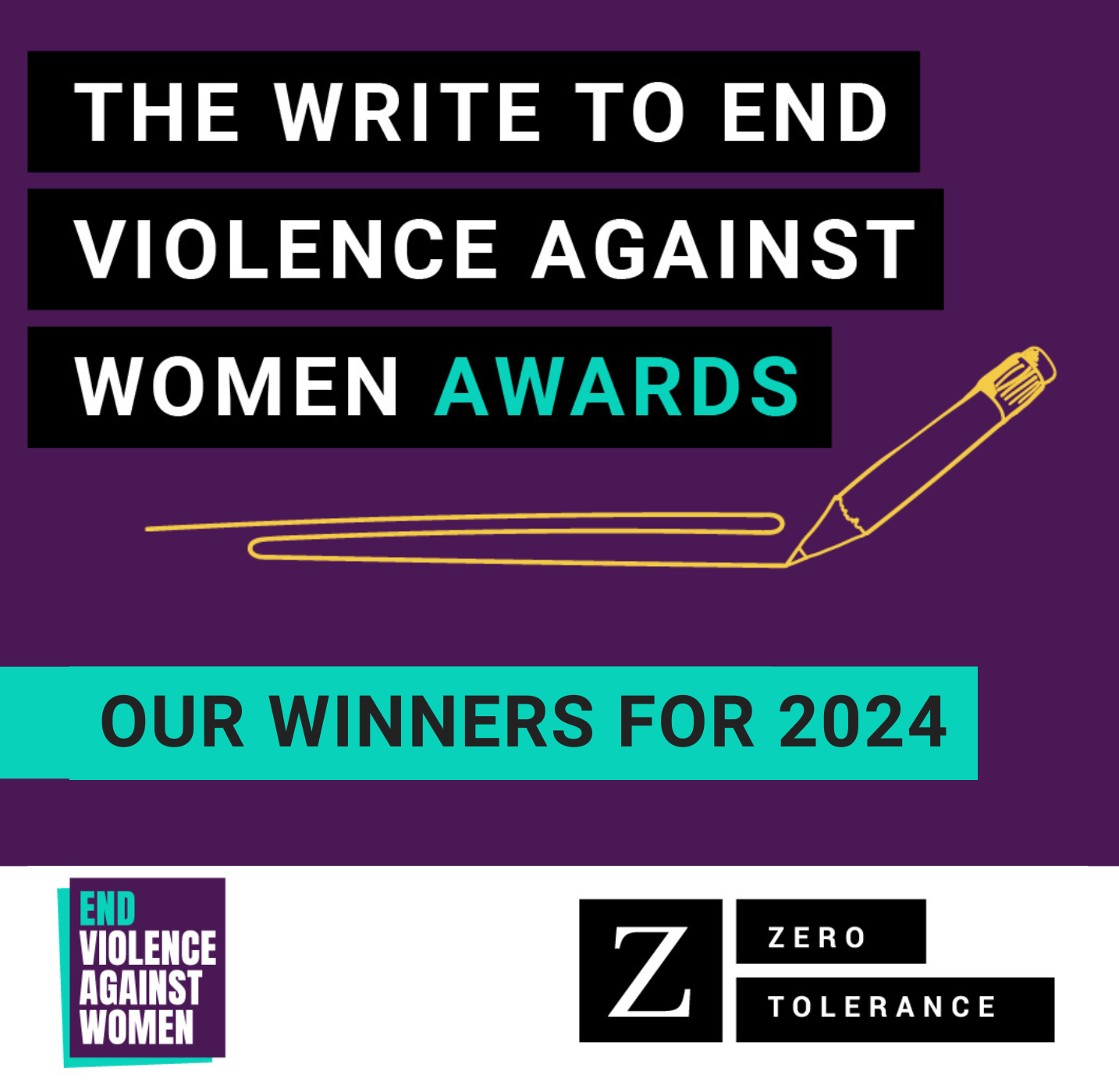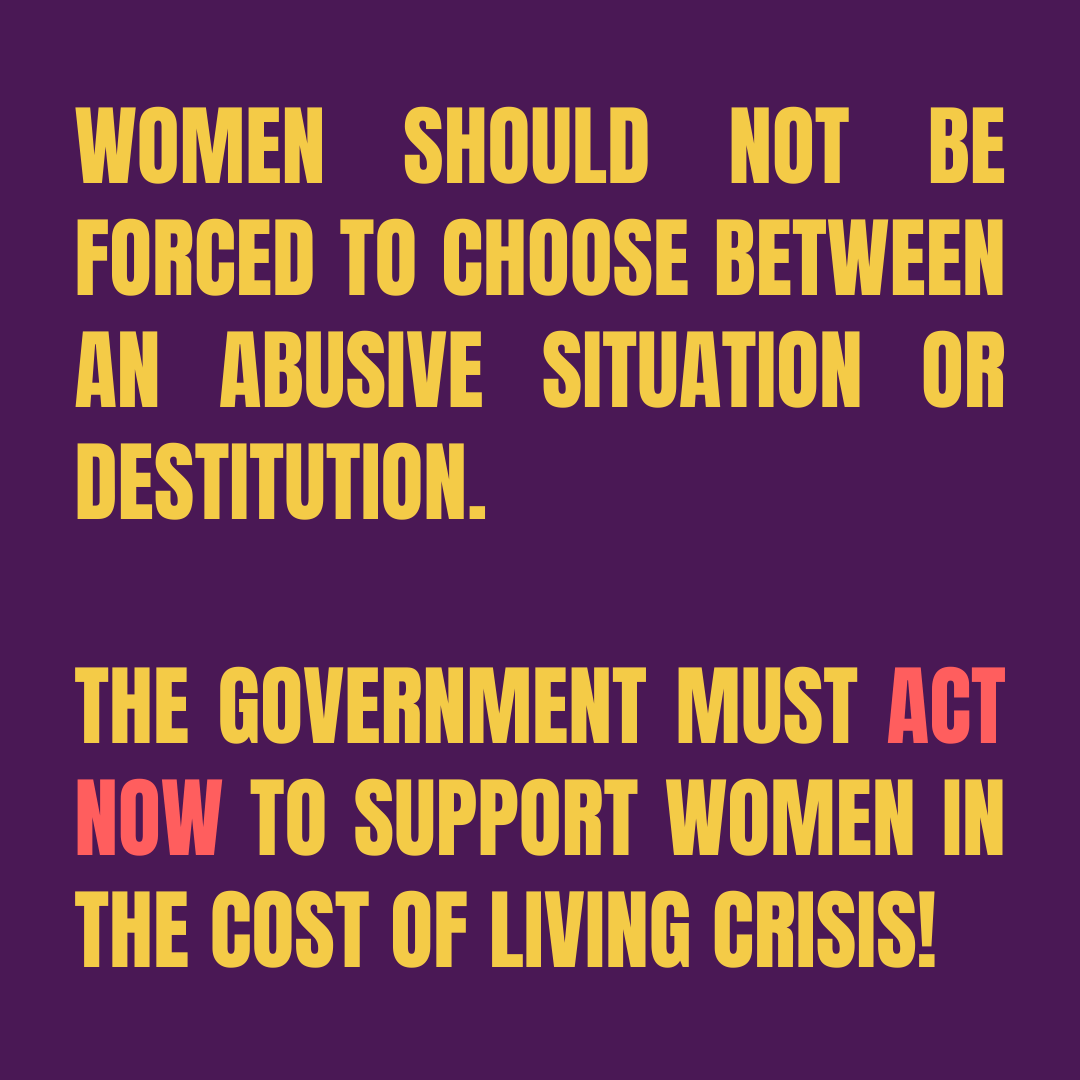 12 Dec
12 Dec
Today (Thursday 17th November 2022), the CEOs and Directors of the End Violence Against Women Coalition, Imkaan, Rape Crisis England & Wales, Respect, Women’s Resource Centre, Welsh Women’s Aid and Women’s Aid Federation of England have made a joint statement on the impact of the cost of living crisis on women and children facing abuse, signed by 80 organisations calling for urgent government action to prevent it.
The coalition of women’s organisations warn that the current crisis is having a devastating impact on women, putting them at greater risk of violence and abuse.
Cost of living crisis: a conducive context for violence against women
Many women already face the unthinkable choice of staying in an abusive situation or experiencing financial hardship or destitution, which can create huge barriers to escaping violence.
Relocation to safe accommodation, disruption to employment, and legal advice for example, can all come with a hefty price tag.
These circumstances are only worsening in the cost of living crisis as women’s incomes are squeezed, putting more women and children at risk of harm, destitution or death.
At the same time as demand for support to escape abuse is increasing, already overstretched specialist services have been confronted with rising bills to operate their life-saving services – leaving women and children with fewer places to turn in their time of need.
Frontline organisations like refuges are facing steep energy bills. Staff are covering the costs of service users from their own pockets, including feeding women who have not eaten for days.
The situation is even more severe for migrant women who are barred from accessing social security and who even risk being criminalised for coming forward.
Women at the sharp edge of the crisis
While the cost of living crisis is affecting us all, it is not doing so equally. Drawing on the latest evidence and their frontline experience, the sector leaders highlight that the current cost of living crisis is disproportionately impacting women, particularly those whose lives are impacted by abuse, and the organisations that support them.
In particular, the poorest women will face alarming circumstances as they are the most affected by cuts to social security and public services.
Despite being the ‘shock absorbers of poverty’, managing household budgets and families who rely on them, women have lower levels of savings and wealth than men and are more likely to be in debt. Women take on the majority of unpaid labour and are more likely to be in insecure employment.
This is even more acute for Black and minoritised women, who experience significantly higher rates of poverty. In addition, disabled women face higher monthly costs for their care and support.
Andrea Simon, Director of the End Violence Against Women Coalition (EVAW), said:
“While the cost of living crisis is exacerbated by the rising cost of energy, it did not emerge overnight. As with the Covid-19 pandemic, many of the risks to women experiencing abuse could have been foreseen and prevented.
The situation we find ourselves in is the result of 12 years of austerity policies that have hit the poorest hardest, widened inequality and hammered public services and specialist women’s organisations supporting victims and survivors of male violence.
The funding crisis in our sector is nothing new, but the Covid-19 pandemic and the latest round of economic shocks is especially dangerous for women. Frontline services cannot keep plugging every gap created by government cuts to statutory services and social security, whilst facing funding cuts themselves.”
Baljit Banga, Executive Director of Imkaan, said:
“Economic justice is part of social justice and the constant struggle towards equality in our society. In the current economic crisis the lives of ALL women must be acknowledged and a comprehensive response must ensure equal participation, contribution and the fulfilment of life.
The response must centre on the lives and material realities of those women who permanently occupy the margins due to intersectional oppression in a system that is inflexible. We need solutions that are transformative and address the long-term survival of our sector and the women and girls who use services.
In the immediate term we need economic re-dress to the way the sector is funded as outlined in our statement that includes solutions to the systemic and structural economic conditions that affect women’s lives. An economic model that rejects the recreation of oppressive and transactional relationships and is built upon women’s contributions is needed as we recover from multiple crisis.”
Farah Nazeer, CEO of Women’s Aid Federation of England, said:
“The rising cost of living is having an unprecedented impact on women and children experiencing domestic abuse and the life-saving services they need. Without action now, we fear frontline services will risk going under, and many women will be forced to stay with an abuser, even when their lives are at risk. We urge the Prime Minister and Chancellor to protect women, fund the organisations they need and tackle the inequalities that mean they are at the sharpest edge of this crisis.”
Vivienne Hayes, CEO of Women’s Resource Centre, said:
“There is growing concern from the women’s sector about the devastating impact acute poverty is having on women and children suffering male violence. We need more action, not rhetoric.”
Jo Todd, CEO of Respect, said:
“For people in relationships where a partner is abusive, the cost-of-living crisis will be adding an additional layer of risk and worry. We know that financial concerns can lead to increased tension and arguments in the home, creating a context where abuse can become more severe or frequent. We also know that survivors can feel less able to flee if they are concerned about money, so more will stay in unsafe situations without an escape route. We stand with EVAW in their call for urgent action to address this crisis.”
Sara Kirkpatick, CEO of Welsh Women’s Aid said:
“There is unprecedented concern across the VAWG sector that years of austerity, social and political factors have intersected to create a perfect storm that is severely hindering service delivery and those in need accessing lifesaving support. It is unacceptable to normalise a culture where the most vulnerable have nowhere to turn. We hope that the Chancellor makes good on his commitments to support those who need it.”
Jayne Butler, CEO of Rape Crisis England & Wales said:
“Victims and survivors of rape and sexual violence can experience a wide range of severe, long-term, even lifelong, impacts and access to specialist support can be a critical part of a survivor’s healing. The cost of living crisis is having a profound impact on survivors and women’s services. It is vital that the Government act urgently so that women and girls are not left without the options of safety and support”.
Key recommendations to ensure women aren’t left behind in the cost of living crisis
As a result of the ever growing cost of living crisis that is affecting survivors and women’s organisations alike, the VAWG Sector in England and Wales are calling on:
Government to:
- Set up an Emergency Fund to support all women and children subjected to male violence and prevent the risk of death or destitution, including migrant women and women with no recourse to public funds, to be distributed by women’s sector infrastructure organisations in England and Wales. These organisations will be accountable to the Government and ensure full GDPR of all data and financial due diligence.
- Universal Credit, working tax credit and other ‘legacy’ benefits to be immediately increased in line with rising rates of inflation and acknowledgement of the energy driven crisis.
- Introduce a charity energy price cap to be introduced that is specific to charities and reflects their different status to businesses.
- Ensure all grants are paid to Voluntary and Community Organisations in advance, as organisations do not have the reserves to subsidise this work using their own funds.
Public Commissioning Bodies to:
- Guarantee 3-5 year contracts with inflationary uplifts.
- Prioritise funding for specialist VAWG services in the community.
- Uplift mid-term contracts to reflect the cost-of-living crisis
READ THE STATEMENT
ENDS
NOTES
Women’s Aid Federation of England’s research has shown:
- Almost all survivors (96%) responding had seen a negative impact on the amount of money available to them as a result of cost of living increases.
- Two thirds (66%) of survivors told us that abusers are now using the cost of living increase and concerns about financial hardship as a tool for coercive control, including to justify further restricting their access to money.
- Almost three quarters (73%) of women living with and having financial links with the abuser said that the cost of living crisis had either prevented them from leaving or made it harder for them to leave.
Refuge’s data has shown:
- Refuge’s specialist technology-facilitated and economic empowerment team has seen an 87% increase in referrals for support with complex cases – they say this can be directly linked to the impact of the crisis.
- 77% of frontline workers surveyed said that the cost-of-living crisis is stopping women from leaving their abusers.
- Refuge warns that it will need an additional £1 million pounds to address the rising costs of running its specialist services.
- Refuge urges Chancellor, Jeremy Hunt, and Secretary of State for Work and Pensions, Mel Stride, to raise Universal Credit in line with inflation and echoes the calls across the Violence Against Women and Girls sector for the establishment of an Emergency Domestic Abuse Fund to support survivors of domestic abuse.
See the Women’s Budget Group’s series of briefings on the gendered dimension of the cost-of-living crisis.
MEDIA CONTACTS
Sinead Geoghegan, Communications Manager at the End Violence Against Women Coalition, sinead.geoghegan@evaw.org.uk (mailto:sinead.geoghegan@evaw.org.uk) 07960 744 502
Emma Dixon, Communications Manager at Respect, emma.dixon@respect.uk.net(mailto:emma.dixon@respect.uk.net) , 07936 943 576
Sophie Weeks, Head of Public Affairs and Communications at Welsh Women’s Aid, press@welshwomensaid.org.uk (mailto:press@welshwomensaid.org.uk) 02920 541 551
Recommended ARTICLES
 12 Dec
12 Dec
 25 Nov
25 Nov
 15 Nov
15 Nov

